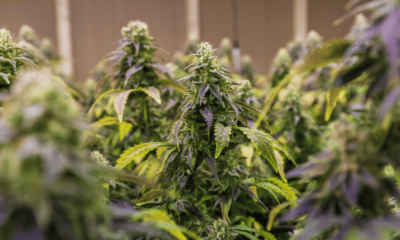There are hundreds of cannabinoids in cannabis from CBD to THC. Although CBD feels like it’s popping up in everything lately, the industry is looking for the next big thing – cannabigerol (CBG).
What is CBG?
Cannabigerol is one of the cannabinoids found in cannabis. It is sometimes referred to as ‘the mother of all cannabinoids’ because it is the precursor to CBD. Other cannabinoids are derived from cannabigerolic acid (CBGA), an acidic form of CBG.
There is very little CBG in plants often as low as one per cent so it makes CBG more expensive than CBD products. CBD is much more available in plants at 20 to 25 per cent. CBG tends to be made from younger plants which contain a higher percentage. THC and CBD both begin life as CBGA before maturing and THC goes on to become CBN in older plants.
It is thought to work the same as CBD in that it interacts with our endocannabinoid system via receptors that are found all over the body. In particular, it may bind to the CB1 receptors in our nervous system or CB2 receptors in our immune system.
It is thought to potentially strengthen the function of anandamide which is a neurotransmitter that affects our pleasure and motivation. It also regulates appetite, sleep and pain relief.
What is CBG good for?
There have been a few studies that show the potential benefits of CBG.
A study from 2020 revealed that CBG may help to fight against antibiotic resistance.
Researchers identified CBG as an antibacterial compound that may serve as a lead for new drug development. Their study found that it was not only antibacterial but it was effective in mice fighting a resilient form of bacteria referred to as methicillin-resistant Staphylococcus aureus (MRSA).
A more recent study from 2021 revealed that it may help in the fight against obesity.
The researchers synthesised three different CBG derivatives, HUM 223, HUM 233, HUM 234. In tests on mice, they discovered that HUM-234 may offer potential as an obesity treatment drug.
The mice were divided into groups for the study; one given just a high-fat diet (HFD), another given an HFD and CBG then one given an HFD and HUM-234. The researchers discovered that in comparison to the other groups, the mice on HUM-234 gained weight much slower and their livers were in a better condition with less fat build-up.
The researchers wrote: “The high-fat diet mice showed liver steatosis while the HUM 234 treated mice livers revealed almost no steatosis. The livers of the mice on CBG showed almost the same levels of steatosis as those on the high-fat diet.”
Should I take CBD or CBG?
Why not combine both? CBD and CBG can actually combine to offer potentially better benefits together. This is often referred to as the entourage effect. Each cannabinoid has unique effects and benefits, and their behaviour may when combined with other compounds.
That said, if you do prefer the idea of one or the other then these are some of the benefits of CBG
CBG for appetite stimulation
A study from 2017 revealed that a form of CBG with no THC was an effective appetite stimulant in rats. It is thought that it may be able to help with cachexia, the muscle-wasting and severe weight loss associated with cancer.
CBG for glaucoma
In one study, researchers treating cats with glaucoma used drops with CBG and Δ9-tetrahydrocannabinol. They noticed there was a reduction in eye pressure but an increase in aqueous humor outflow which is a liquid that provides nutrition to the eyes.
CBG for Huntingdon Disease
In another study from 2015, researchers discovered that CBG may have neuroprotective properties when it comes to Huntington disease. They examined mice with an experimental model of Huntington Disease. They noted that CBG may act as a neuroprotectant minding nerve cells from damage while improving motor defects. It also helped to preserve striatal neurons against 3-nitropropionic acid toxicity.
CBD for Inflammatory Bowel Disease
A study from 2013 on mice that had inflammation similar to IBD induced in their colons revealed that it may help to reduce the production of nitric oxide. It also reduced the inflammation present.
How do I know if CBG works for me?
The best way to start taking it is to find a product that suits your needs. If it’s a muscle problem then maybe topicals may be better suited as the product can target the exact area. If you aren’t a fan of the hemp after-taste then maybe edibles may suit you?
As with CBD, it can take a while to notice the effects of CBG so keeping a note of the effects you do notice is a great way to monitor your intake and the benefits.
It is worth doing your research to find a reputable brand that you can trust. As it is difficult to produce and present in plants at a lower percentage, it may be more expensive to buy. The most common CBG product on the market is oil but there are increasingly other options available including CBG vaping e-liquids.
Is CBG legal?
It is legal, as long as the production does not exceed the legal allowance of THC. THC is still a controlled substance in the UK.
Can CBG get me high?
Nope!
CBG is non-psychoactive which means they will not get you high like THC can. The same can be said for CBD.
Read more: CBD isolate may reduce the symptoms of Parkinson’s Disease

 News6 months ago
News6 months ago
 News6 months ago
News6 months ago
 Science5 months ago
Science5 months ago
 Industry6 months ago
Industry6 months ago
 News6 months ago
News6 months ago
 News5 months ago
News5 months ago
 Health4 months ago
Health4 months ago
 News5 months ago
News5 months ago












